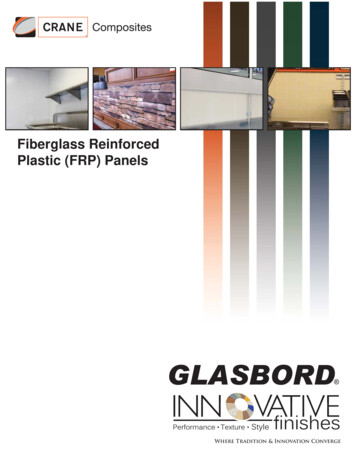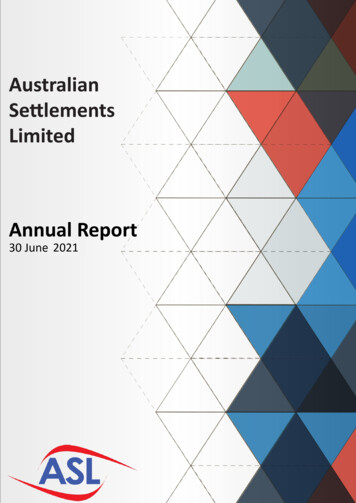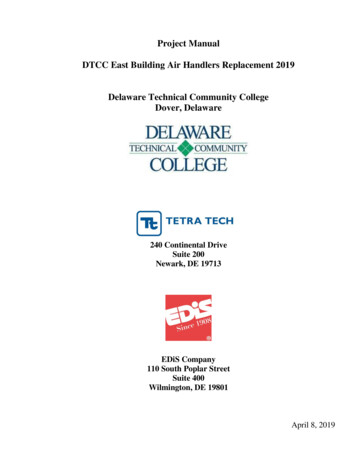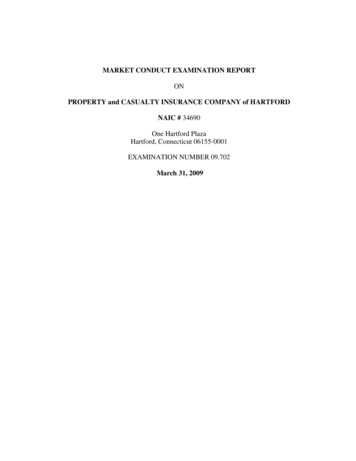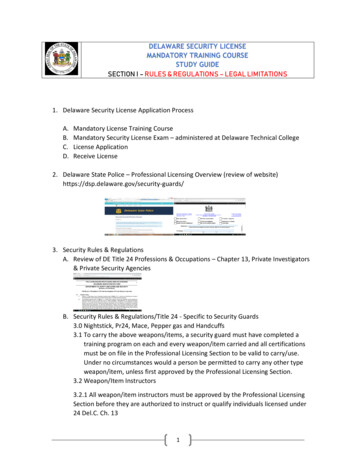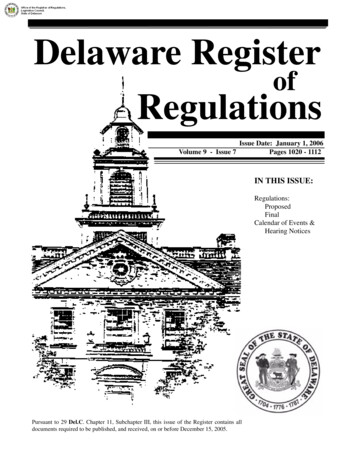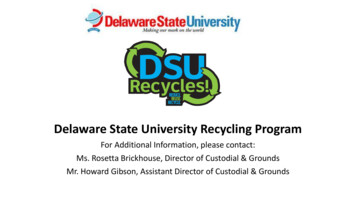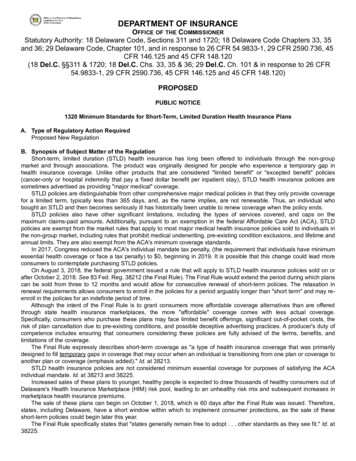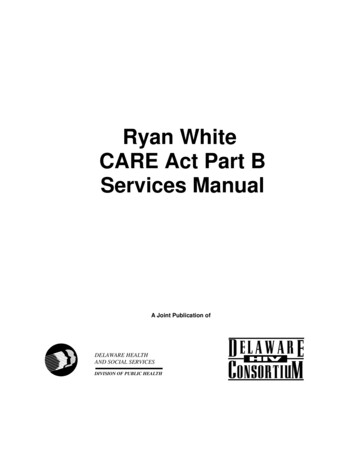
Transcription
Ryan WhiteCARE Act Part BServices ManualA Joint Publication ofDELAWARE HEALTHAND SOCIAL SERVICESDIVISION OF PUBLIC HEALTH
TABLE OF CONTENTS1.“Ryan White 101”Introduction to Ryan White FundingEligibility Criteria for Ryan White CARE Act II ServicesRyan White Eligibility: Frequently Asked Questions2.Ryan White CARE Act II Funded Services in DelawareAIDS Drug Assistance Program (ADAP)For Clients without InsuranceFor Clients with Insurance (Limited or Full Pharmaceutical Coverage)Frequently Asked QuestionsMedical Case ManagementFood ProgramsHealth Insurance ProgramProgram OverviewThe Ryan White Program and the Affordable Care ActFrequently Asked QuestionsHome and Community Based ServicesHousing AssistanceEpisodic AssistanceRental VouchersMental Wellness CounselingNutritional CounselingState Direct ServicesGeneral ServicesEye CareEye Care: Frequently Asked QuestionsDental CareDental Care: Frequently Asked QuestionsTransportation3.Delaware HIV/AIDS Case Management Standards
INTRODUCTION TO RYAN WHITE FUNDINGCongress enacted the Ryan White Comprehensive AIDS Resources Emergency (CARE) Act of1990 on August 18, 1990 to improve the quality and availability of care for low-income,uninsured, and underinsured individuals and families affected by HIV disease. In fiscal year2008, more than 2.1 billion in Federal funds was appropriated to all 50 States, the Districtof Columbia, Puerto Rico, and U. S. territories.This Ryan White federal program was designed to achieve three major purposes: Lessen the burden on states and cities most affected by HIV/AIDS by providingsubstantial federal funding for the care and treatment of people with HIV disease; Foster a coordinated approach to the provision of care, treatment, and supportservices for people with HIV/AIDS; Promote a community-based, strategic response to AIDS by local organizations andadvocates, as well as local public entities.The Ryan White HIV/AIDS Program was enacted in 1990 and, in addition to 2006, wasreauthorized in 1996 and 2000. In 2006, the CARE Act was renewed through the RyanWhite HIV/AIDS Treatment Modernization Act of 2006, in the Public Health Service (PHS)Act under Title XXVI flexibility, to respond effectively to the changing epidemic. The new lawchanged how Ryan White funds can be used, with an emphasis on providing life-saving andlife-extending services for people living with HIV/AIDS across this country. TheModernization Act include the following significant changes: New method for determining eligibility for Part funds gives priority to urbanareas with the highest number of people living with AIDS while also helping mid-sizecities and areas with emerging needs. New method for distributing Part A funds directs money to metropolitanareas with the highest number of people who are HIV-positive. It alsoencourages outreach and testing, which will get people into treatment sooner andsave more lives. More money will be spent on direct health care for Ryan White clients. Underthe new law, grantees receiving funds under Parts A, B, and C must spend at least 75percent of funds on “core medical services.” The new law recognizes that HIV/AIDS has had a devastating impact onracial/ethnic minorities in the U.S. African Americans accounted for 49 percent ofall HIV/AIDS cases diagnosed in 2005. The new law codifies the Minority AIDSInitiative for HRSA's Ryan White programs.The Ryan White Program funds HIV/AIDS health care and support services under severaldifferent parts, or sections:Part A provides emergency relief assistance to “eligible metropolitan areas” (EMAs)that are disproportionately affected by HIV/AIDS. EMA’s are cities that have reportedat least 2,000 AIDS cases or have experienced a per capita incidence of AIDS casessurpassing 25 per 10,000 population. TheFY 1999 appropriation totaled 485.8million in formula and supplemental funds and was awarded to 51 EMAs.
Part B assists States and eligible U.S. territories in improving the quality,availability, and organization of HIV/AIDS health care and support services, andprovides access to high-cost pharmaceuticals through the AIDS Drug AssistanceProgram (ADAP). The FY 1999 appropriation totaled 710 million, which include 461million for ADAP funding. These funds are awarded according to a formula based onthe number of reported AIDS cases in each state during the previous two years andtaking into account the state level of per capita income.Part C supports outpatient HIV early intervention services for low-income, medicallyunderserved people in existing primary care systems. In FY 1999, Title III wasappropriated 94.3 million.Part D enhances access to comprehensive HIV/AIDS care and services for children,youth, women and their families with or at risk for HIV, as well as access to clinicalresearch. The FY 1999 appropriation totaled 46 million. These funds have been usedto establish a pediatric AIDS research demonstration program to developexperimental drugs for pediatric AIDS patients. It also funds research, evaluation,and assessment programs.Part FThe Special Projects of National Significance (SPNS) Program supports thedevelopment and evaluation of innovative HIV/AIDS service delivery models thathave potential for replication, locally and nationally. As authorized in the CARE Act, 25 million was allocated to the SPNS Program for the FY 1999 appropriation.The AIDS Education and Training Centers (AETC) Program supports educationand training for health care providers to counsel, diagnose, treat, and manage carefor individuals with HIV infection and to help prevent high risk behavior that causeinfection. The FY 1999 appropriation totaled 20 million.The HIV/AIDS Dental Reimbursement Programassists accrediteddental schools and post-doctoral dental education programs with uncompensatedcosts incurred in providing oral health treatment to patients with HIV disease. The FY1999 appropriation was 7.8 million.The Health Resources and Services Administration (HRSA) is the federal agency responsiblefor administration and oversight of the Ryan White Program. HRSA administers the grantapplication process, disburses Ryan White funds, and provides technical assistance to allgrantees under the Act.The procedures in this manual relate to accessing Ryan White Part B funds, administered bythe Delaware Division of Public Health, and the Delaware HIV Consortium.
General Eligibility CriteriaFor Delaware’s Ryan White Part B ProgramsIn order for persons to receive services funded with Ryan White Part B dollars, theymust meet the following criteria: Be diagnosed with HIV disease. The Western Blot or other equivalentconfirmatory test must document an HIV diagnosis. An anonymous HIV testresult is NOT considered to meet this standard. Be a resident of the State of Delaware. Be income eligible. Ryan White dollars are targeted to meet the needs of lowincome persons living with HIV/AIDS. Client Income should be calculated uponIntake into case management services, at subsequent recertifications foreligibility (which should take place every six months), or when there is asignificant change in the client’s income that might change a client’s eligibilityfor specific services. Client Income is reported as a percentage of the Federal Poverty Level (FPL).The FPL Guidelines are reviewed, updated and published annually by thefederal government, typically in January or February of each year. The mostrecent FPL Chart is available upon request from the Delaware HIVConsortium. Different services within the Ryan White Part B Program have differentincome limits. For example, a client whose income has been calculated to be247% of the FPL is eligible for assistance in paying for his medications, butnot for assistance in paying for his housing costs. Income should be calculated using the Modified Annual Gross Income (MAGI)methodology. MAGI allows some specific types of income to be excludedfrom the calculation. It also requires that income assessment be based onhousehold income for legally-married couples. Be program eligible. Many Ryan White programs have a limit (a “cap”) to theamount of service available through those programs in a given year. However,some of these caps may be waived (through a special appeal from the HIV/AIDSCase Manager) if the service is in the client’s best interest, is included as part ofthe Care Plan, and is approved by the Ryan White Program Administrator. Be referred through anManagement ame for Eligibility Determination: Within the first thirty calendar days fromthe client’s intake date, HIV/AIDS Medical Case Managers are expected to completea financial assessment of the client resources and income. If the financialassessment is not completed by the end of that time period, the case managersmust consult their Case Manager Supervisor for a determination of next steps to be
taken. In general, client eligibility for services must then be reviewed, evaluatedand documented at least once every six months. The 30-day grace period does not apply to clients reapplying for the RyanWhite Part B Program after being found ineligible. In such cases, financialassessments must be completed in their entirety before the clients can reenroll in the Ryan White Program.Scope of Appropriate Referrals for New Clients: Persons may begin accessing RyanWhite services immediately upon their enrollment into HIV/AIDS Medical CaseManagement Services. However, the types of those services are limited untileligibility determination is complete, based on the method by which a client isreferred to an HIV/AIDS Medical Case Management program. Internal Referral: This type of referral originates within Delaware’sestablished HIV/AIDS Care System (from one of the HIV Wellness Clinics oran approved HIV testing program, for example). During the first thirty days(or until the client’s eligibility determination is completed), the onlyappropriate referrals for services are ones to HIV medical care and toDelaware’s AIDS Drug Assistance Program. If the Eligibility Determination isnot completed by the end of the thirtieth day, the client’s enrollment in theRyan White Part B Program will be closed. No further services will beprovided through the Program until such time as the Eligibility Determinationhas been completed and the results reported to the Ryan White Part BCentral Office. External Referral: This type of referral originates outside Delaware’sestablished HIV/AIDS Care System. It may come from medical or socialservice providers in another state, a Delaware service provider that does notspecialize in serving persons living with HIV/AIDS, or from a client selfreferral. Proof of the client’s HIV/AIDS status is absolutely necessary beforeany referral can be made on the client’s behalf. No referrals for servicesshould be made until proof of HIV status and determination of financialeligibility is completed.Ryan White Program as “Payer of Last Resort”: Whenever possible, clients and theirHIV/AIDS Medical Case Managers must have made reasonable efforts to secureother funding or resources prior to accessing Ryan White Part B funds for theservice requested. Ryan White funds are always to be considered to be “the payerof last resort” for HIV outpatient services and related conditions. Medicaid: If clients have income of less than or equal to 138% of the FederalPoverty Level, they should apply for health coverage through Medicaid. Medicaid AIDS Waiver: Clients who have an AIDS diagnosis and meet certainmedical standards are eligible for additional services offered by ManagedCare Providers through Medicaid. These services may include HIV/AIDSMedical Case Management, private duty nursing, homemaker services, adultmedical day care, respite care, mental wellness services and supplemental
payment for foster care for children and adults with AIDS or HIV relateddiseases.o Medicaid AIDS Waiver clients are also eligible for all services normallycovered by Medicaid.o Medicaid AIDS Waiver clients can receive Ryan White Part B servicesthat are not available through Medicaid or the Medicaid AIDS Waiver. Affordable Care Act (ACA) Coverage: If clients have income greater than138% of the Federal Poverty Level, they should seek health insurancecoverage through the ACA Marketplace. If ACA insurance coverage is deniedto the client, it should be documented in the client file maintained by theclient’s HIV/AIDS Medical Case Manager.Ryan White Part B funds are intended to support only the HIV/AIDS related needsof eligible individuals. There must be an explicit connection between any servicesupported with Ryan White Part B funds and the intended recipient’s HIV status, orcare giving relationship to a person with HIV/AIDS.Ryan White Part B funds may not be used for bereavement support for infected andaffected HIV/AIDS family members since those services cannot be construed tohave direct benefit to HIV-infected individuals.RYAN WHITE ELIGIBILITY – FREQUENTLY ASKED QUESTIONS1. What determines if a client is financially eligible for Ryan WhiteServices?Two criteria are considered when making a determination of financial eligibility forRyan White services: prior qualification or current/projected income.Prior Qualification: Proof of current qualification for Social Security Income, SocialSecurity Disability, or Medicaid can establish eligibility for Ryan White Services.Note: The Ryan White Program is the payer of last resort for low-income clients.Clients must apply for and utilize all other funding sources for which they areeligible.Current Income: The client’s monthly gross income must be within the FederalPoverty Limits for each service. These income criteria vary from program toprogram. A client may be eligible for some Ryan White funded services and notothers. If client’s income is over the noted limits, a co-payment may berequired.
2. How is monthly income determined?A client’s total gross income received on a regular basis, such as weekly, monthly,quarterly, is added together. Some examples of income are: wages or salary,Social Security Benefits, Welfare Benefits, Veteran’s Benefits, Pensions, OtherEmployment, Annuities, and Interest Income.To determine the monthly income for a client/family:PaidPaidPaidPaidevery week:every other week:two times per month:once per month:Multiply incomeMultiply incomeMultiply incomeMultiply incomebybybyby4.332.16721 meThe client’s income, if consistent, may be verified from one or two pay stubs. Ifincome is from hourly work, and may vary over time, the income should beaveraged over a longer period of time. This is very important when the client hasrecently lost employment. If the applicant is unlikely to be able to work again in thenext six months, then using a monthly pay of 0.00 is acceptable. However, if theapplicant is employable (is physically well and has desirable job skills), the incomeshould be averaged over three months.In the case of seasonal workers (such as farm workers), income should beaveraged over a six-month period, in order to include at least one time period of fullemployment and one time period of low employment.3. What are resources?Resources are non-income financial assets owned solely or jointly by the client.While resources do not factor into the determination of a client’s eligibility for RyanWhite Part B services, gathering such information may be helpful in assessing whattools the client has to meet his or her needs, particularly those needs that falloutside the scope of Delaware’s Ryan White Part B Program.Some examples of resources are:Property Houses or land owned solely or jointly by the client are considered asresources. However, If the property is still occupied by the client (i.e., the house is theclient’s domicile, the property may be excluded from theresources; If the property is income producing, such as rental property, itmay be considered as a resource. In addition, the rent receivedfrom any tenants would be considered as income.
If the property is jointly owned, the value of the resource isbased on the equity in the property, split evenly among the coowners.Vehicles One car per client may be excluded from being counted as a resource. Allother cars and vehicles (unless directly related to employment), ownedsolely or jointly by a client, should be counted as resources. The values ofthose vehicles are based on the Blue Book value (resale value) of thevehicles in question.Burial Monies A client may set aside up to 5,000.00 for burial, which can be excludedfrom resources. These funds may be set in a designated bank account,such as a burial trust fund.Liquid Assets (Other than Burial Monies) The current value of any stocks or bonds would be considered a resource. The current balance of any checking or savings accounts, money marketaccounts, investment accounts or certificates of deposit are considered tobe resources.5. How is the Verification of Income and Resources done?A client must provide to the HIV/AIDS Medical Case Manager verification of allincome. These documents should be photocopied and kept in the client’s file. If theclient experiences difficulties in obtaining the necessary documentation, theHIV/AIDS Medical Case Manager should offer assistance, as appropriate.Documents to be considered in determining eligibility for Ryan White Part B servicesinclude, but are not limited to: Social Security card and Social Security payment information Copies of income checks Payroll / check stubs from the client’s employer(s) Financial account statements for two (2) months prior to assessment Income tax returns Health insurance cards Proof of health insurance premiums Life insurance policies where the client is the insured A PAS Determination Letter from Medicaid, showing approval or denialThe HIV/AIDS Medical Case Manager has the right to request other types ofresource or income information, if appropriate and necessary.
As the HIV/AIDS Medical Case Manager completes the financial assessment, theappropriate information should be noted on Page One of the “EligibilityDetermination Form” provided by Delaware’s Ryan White Program. The CaseManager will calculate the income level as a percentage of the Federal PovertyLevel, noting it in the appropriate place on Page Two of the form. The form is thensigned by both the client and the client’s HIV/AIDS Medical Case Manager. Theform, along with the supporting documentation, should be filed together in theclient’s case management file.Financial determination takes place at least every six months. If the client’s incomehas not changed when the next determination takes place, the client and theHIV/AIDS Medical Case Manager may attest to that fact in the box at the bottom ofPage Two. However, if the client’s income HAS changed, then a new “FinancialEligibility Form” should be completed.Each time a client’s financial eligibility has been determined, the HIV/AIDS MedicalCase Manager should report it to the Ryan White Program’s Central Office using the“Ryan White Enrollment, Update and Termination” form. The client’s income level should also be entered in the client’s CAREWare file,on the “Annual Review” tab. The “Recertification of Ryan White Eligibility” should be recorded on the“Service” tab by selecting “Recert” in the drop-down menu in the table. This information should be reported for all clients who are or may bereceiving services funded by Delaware’s Ryan White Part B Program.
AIDS DRUG ASSISTANCE PROGRAMDelaware’s AIDS Drug Assistance Program (ADAP) provides financial assistance topay medication costs for HIV and related conditions. These programs serve HIVinfected persons with low and moderate-incomes.ADAP FOR CLIENTS WITHOUT HEALTH INSURANCE:This program serves individuals who cannot have their medications paid for throughan insurance plan. These individuals must access their HIV medical care and receivetheir medications through the Christiana Care HIV Wellness Clinics in order toreceive their medications. In the event that a Christiana Care HIV Wellness Clinicdoes not stock a particular medication needed by a client, arrangements can bemade to get the medication through an approved community-based pharmacy. Theclinic staff will contact the Central Office of Delaware’s Ryan White Part B Program;the Program Staff there will generate an ADAP pharmacy card that the client canuse at the community-based pharmacy.Cap: NoneIncome Criteria: Up to 500% of the Federal Poverty Level (FPL)Individual/FamilyIncome:Annual Gross Income0 to 500% of FPLPerServiceChargeTotalAllowableChargesNo ChargeNo ChargeApplication Procedure: Refer the client to the Christiana Care HIV Wellness Clinic closest to theclient’s home.
ADAP: CLIENTS WITH INSURANCEAND LIMITED OR FULL PHARMACEUTICAL COVERAGEIf a client has health insurance but the policy does NOT cover all client’s needed HIVmedications, or if the HIV medications have large co-payments associated withthem, Delaware’s ADAP Program may provide some financial assistance for thesemedication costs.The client’s case manager may make a special request to receive assistancethrough the Ryan White Part B Program if the following criteria are met: The client and Case Manager have tried to obtain the medication directly throughpharmaceutical companies and are denied. There are sufficient Ryan White Part B funds in the budget to cover the costs forthe medication.If more comprehensive pharmaceutical coverage is available for an increased costthrough the client’s employer, the client and Case Manager must access thispharmaceutical coverage using the Ryan White Health Insurance Program, availablethrough the Delaware HIV Consortium. (See “Health Insurance Program”,elsewhere in this manual.)Cap: NoneIncome Criteria: Up to 500% of the Federal Poverty Level (FPL)Individual/FamilyIncome:Annual Gross IncomePerServiceChargeTotalAllowableCharges0 to 300% of FPLNo chargeNo charge301 to 400% of FPL5% of medicationcostUp to 5% ofannual gross income401 to 500% of FPL10% of medicationchargeUp to 10% ofannual gross incomeCo-payments may be waived if program funding allows it. Contact the Ryan WhiteProgram Administrator with the Delaware Division of Public Health for moreinformation.
Application Procedure: For medications not included on the current Formulary, the case manager mustget pre-authorization from the Ryan White Program Administrator. The Case Manager must verify the client’s Ryan White eligibility and financialstatus, and document that in the case notes. The Case Manager must review the program guidelines and the client’sresponsibilities for the program in detail with the client. The Case Manager should verify that the community-based pharmacy selectedby the client is one that participates with Delaware’s ADAP Program. Thisverification can be done by contacting the Ryan White Central Office staff. The Case Manager mails / faxes the following documents to the Central Office: A completed Ryan White Enrollment, Update and Termination (EUT) Formrequesting approval for client to receive medications through ADAP. Besure to mark the box for the appropriate level of ADAP servicesrequested.An Interagency Referral FormConsent to release medical information to DHSS signed by clientA copy of the client’s Health Insurance Card(s).Central Officecompleteness: SupportstaffmembersreviewthepaperworkforAll appropriate information (e.g. application for Medicaid) must beprovided and the form duly signed by the Case Manager.If the client is AIDS Defined, the Ryan White EUT Form must also besigned by the organization’s Case Management Supervisor.Incomplete forms are returned to case manager. If questions arise regarding the form, the Central Office Support Staff maycall the parties involved (case manager, case manager supervisor, or insurancecompany). For difficult cases, the Support Staff may consult with the Ryan WhiteProgram Administrator. Appropriately completed forms, which belong to eligible clients, areprocessed. ADAP cards are by the Central Office staff at the Delaware Division ofPublic Health. The cards are mailed to the client at the most recent address onfile at the Central Office. A copy of the ADAP card may be requested by theclient’s Case Manager, if needed.Recertification Process:
The documents submitted as a part of the application process must be updated andre-submitted whenever there is significant change in their client’s financial or medicalsituation, andat the end of the six-month enrollment period, as prompted by the CentralOffice staff members.Billing: The Delaware ADAP program may designate the pharmacy from which clientsobtain medication on a regular basis. Community-based pharmacies must enroll in the Delaware ADAP Pharmacynetwork and register with the ADAP Pharmacy Benefits Manager to receivepayments through Delaware’s ADAP.
Frequently Asked Questions (FAQ’s)Question: My client’s HIV medications were changed. Do I need to submit a newRyan White payment Authorization form?Answer: No. As long as the new medications are on the Delaware ADAPFormulary nothing needs to be done. The most recent versions of the ADAPFormulary can be found on the Delaware HIV Consortium’s website(www.delawarehiv.org) or through the Ryan White Central Office.Question: My client selected a pharmacy for his ADAP medications. The pharmacistat the pharmacy branch near the client’s place of residence was unfamiliar with theADAP program and was reluctant to participate. The client, subsequently, opted fora different pharmacy. Should DPH be notified of the change?Answer: Not necessarily. The ADAP card allows a client to use any pharmacybranch within the state that is willing to participate. A client is not tied to aparticular pharmacy chain and/or branch.Question: Who decides what medications are covered by Delaware’s ADAP?Answer: The Formulary is a list of medications that have been approved forpayment through the Ryan White ADAP. The Formulary Committee,facilitated by the Delaware Division of Public Health, maintains the Formularylist. The Formulary is updated semi-annually, or more frequently ascircumstances warrant.Question: What do I do for clients who need drugs that are not on the ADAPFormulary (i.e., non-HIV related medications)?Answer: There are a number of things that you and your client can work ontogether to meet that need. Consider the use of generic medications, which tend to be less expensivethan “brand name” drugs. The client, the case manager, the prescribingphysician, and/or the pharmacist should make this decision jointly. Explore the use of other financial assistance programs to cover the cost ofan immediate prescription of the medication. Check with communitybased AIDS Services Organizations, churches, other charitableorganizations, etc. Contact the pharmaceutical company manufacturing the medication and askabout their indigent client program for expensive medications. Strategize about future funding for the medications, such as Medicaid or theMedicaid AIDS Waiver.Question: Is the Delaware Prescription Drug Program (DPAP) and the AIDS DrugAssistance Program (ADAP) the same thing?Answer: No. The Delaware Prescription Drug Program) is offered throughthe Delaware Division of Health and Social Services, This program is fundedthrough tobacco settlement funds, and provides up to 2500 per individual ineach calendar year for eligible clients. The goal of the program is to provideprescription assistance to elderly and/or disabled individuals currently without
prescription coverage who have incomes below 200% of the poverty level orhave prescription costs exceeding 40% of their income. DPAP coversmedically necessary prescription drugs. The program does not pay for any ofthe drugs or diabetic supplies for Medicare recipients. Medicare currentlycovers these supplies for both insulin and non-insulin dependent patients.Clients must make a co-payment of 5 or 25% of the cost of the prescription,whichever is greater. The co-pay is collected by the dispensing pharmacy. Tobe eligible for DPAP, clients must reside in the State of Delaware, be at least65 years old or qualify for Social Security Disability benefits. The incomeeligibility limit is set at 200% of the Federal Poverty Level (FPL). If a clientmeets these eligibility requirements, the client is expected to apply for theservice. For more information about DPAP, call 1-800-996-9969, Option 2,then Option 1. If accepted for DPAP, clients may still get assistance throughthe AIDS Drug Assistance Program with any co-payments for DPAP.Question: What is the recertification process for ADAP enrollment?Answer: Re-certification of all ADAP clients is required at least once everysix months. This is a requirement for all ADAP clients on ongoing ADAPmedication. Support staff members send out reminder letters of the recertification (ticklers) to the client two months to the anniversary of the card.The letter is copied to the appropriate case management agency. Casemanagers then complete and send to the central office completed Ryan WhiteEnrollment, Update and Termination forms. Central Office Support staff willreview the form for completeness and, if appropriate, process a new cardthat is then mailed to the client. If recertification is not completed by theanniversary date, the client case should be closed and the client is no longereligible for services paid for through the Ryan White Program.Question: How should a case manager terminate a client’s participation inDelaware’s ADAP?Answer: The Case manager or service provider will contact the CentralOffice with a reason as to why a particular client's case needs to be closed.The Central Office will verify the information with the client, if necessary. Theclient will be advised to destroy the card, give it to the case manager, or mailit to The Ryan White Program in Dover, DE. The client’s ADAP enrollment willbe closed in the Ry
dental schools and post-doctoral dental education programs with uncompensated costs incurred in providing oral health treatment to patients with HIV disease. . The procedures in this manual relate to accessing Ryan White Part B funds, administered by . For example, a client whose income has been calculated to be

